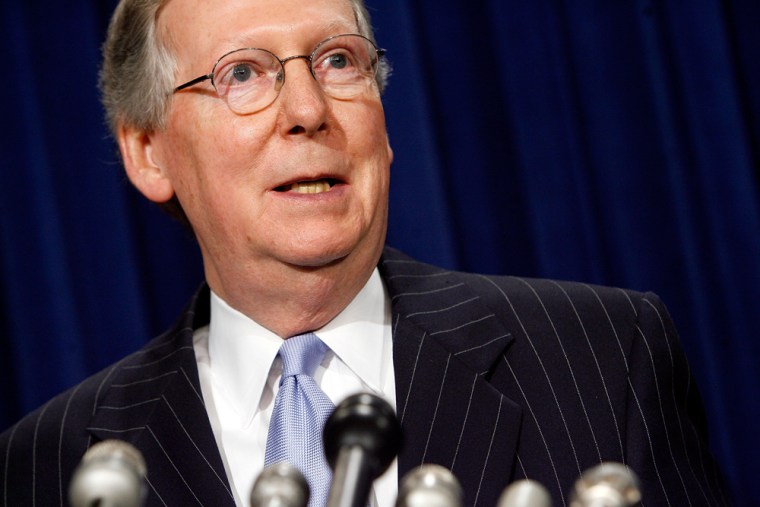Senate Republicans blocked a broad energy bill Thursday because it included billions of dollars in new taxes on the biggest oil companies.
Democratic leaders fell one vote short, 59-40, in getting the 60 votes needed to overcome a GOP filibuster. Democrats said they would strip the taxes from the legislation to move the bill forward.
Majority Leader Harry Reid of Nevada said he hoped to get the revised energy package approved later in the day, including the first increase in automobile fuel efficiency in three decades and massive increases in the use of ethanol as a motor fuel.
He said we will "eliminate the tax title."
Republican leader Mitch McConnell of Kentucky predicted the revised bill would be approved with wide bipartisan support.
Guaranteed veto
The legislation, if passed by the Senate, would have to be voted on by the House, which a week ago approved legislation that included the $21 billion tax increases with revenues marked for promoting renewable fuels and energy efficiency.
But Senate Republicans stood firm on opposing the tax increases, which they said would guarantee a veto by President Bush.
McConnell chided Democrats for pushing a "massive tax increase" that he said "they knew would never be signed into law" because of the president's opposition.
Reid countered that the Senate shouldn't back away from the needed tax measures "just because the president doesn't like it."
"We must begin to break our country's addiction to oil," Reid said.
Fuel economy and alternative fuels
As Senate Democrats reworked the legislation, Democrats said that even without the tax provision the legislation will make major strides toward shifting U.S. energy policy.
The bill's centerpiece requires automakers to increase vehicle fuel economy to an industry average of 35 miles per gallon over the next 13 years - a 40 percent increase and the first boost in the federal gas mileage requirement since 1975 when the rules were first enacted.
For years, auto companies have fought successfully any increase in the automobile mileage standard which now is 27.5 mpg for cars and 22.2 mpg for small trucks and SUVs. But an agreement forged with the help of Rep. John Dingell, D-Mich., the longtime protector of the auto industry in Congress, cleared the way for the new requirements which have bipartisan support.
It also would rapidly ramp up the required production of ethanol, eventually to 36 billion gallons a year by 2022, a sevenfold increase. At least 21 billion gallons must be from feedstock other than corn such as prairie grasses and wood chips.
And it would increase energy efficiency requirements for appliances and federal and commercial buildings and require faster approval of federal energy efficiency standards.
Senate Democrats earlier dropped a House-passed provision that would have required investor-owned utilities nationwide to generate 15 percent of their electricity from solar, wind and other renewable sources.
The mandate was fought by the electric utility industry and, especially the Atlanta-based Southern Co. They argued that the mandate would lead to higher electricity costs, especially in regions that do not have an abundance of wind or solar energy, such as the Southeast.
The oil companies had pressed lawmakers to oppose repeal of the $13.5 billion in tax breaks provided them by Congress in 2004 and 2005. They argued the tax relief was essential as an incentive for domestic oil and gas production and refinery expansion and that rolling back the tax breaks would lead to higher energy prices.
Democrats released a report by the Joint Economic Committee on Wednesday that concluded that rescinding the tax breaks would have no impact on production decisions or "have any effect on consumer prices for oil and gas."
